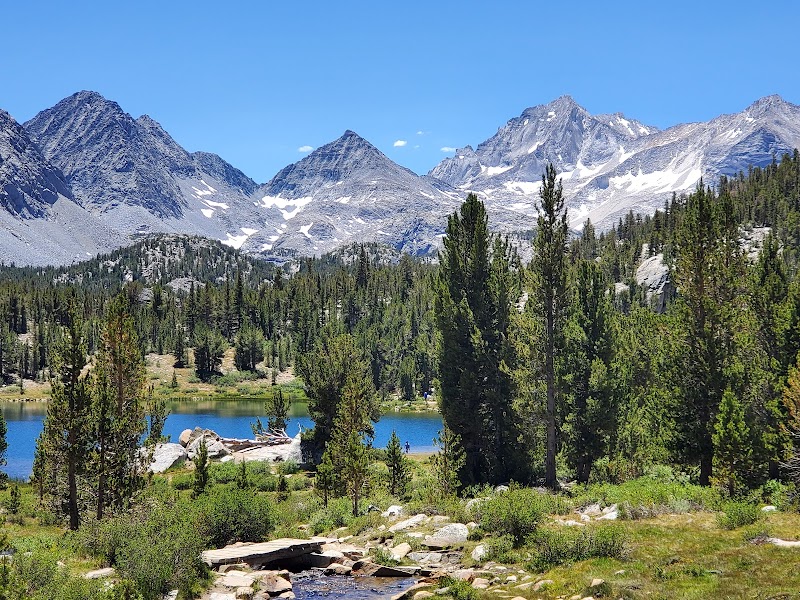
White Mountains Wilderness Adventures
White Mountains Wilderness offers striking landscapes characterized by rugged terrain, ancient bristlecone pines, and clear high-altitude views perfect for outdoor enthusiasts.
Popular Activities
Journey into the Wild Expanse: Exploring California's White Mountains Wilderness
Embark on a journey into one of the most captivating landscapes California has to offer, the White Mountains Wilderness. This majestic expanse promises not only vast horizons and ancient bristlecone pines but also a rugged adventure for the spirited outdoor enthusiast. The White Mountains are a beacon for those yearning for an authentic connection with nature, where the air is crisp, and the silence is book-ended by the whispers of the wind across the ridges. Here, rocky outcrops stand as time-weathered sentinels, watching over valleys that showcase the rawness of nature's wonder. This journey promises immersion into the wild, a journey where every trek, breath, and pause is drenched in a serenity that only high-altitude wilderness can provide.
Venturing into the White Mountains Wilderness demands preparation and respect for the environment's unique challenges, notably its dramatic elevations and remote trails. This is not only a space for contemplation but also a playground for the adventurous spirit. As you plan your trip, it is crucial to understand the logistics of navigating an area that offers few modern comforts but rewards those who tread carefully with unforgettable vistas. Trails weave through the ancient pines, guiding explorers across rugged terrain where the elevation often exceeds 10,000 feet. Here, the air is thin, and the climb challenging—an invitation to test your limits and connect deeply with the world around you.
For the camping enthusiast, designated sites such as the Cottonwood Basin provide an essential base from which to explore. Remember, the wilderness is pristine and requires all visitors to follow Leave No Trace principles to maintain the delicacy of this environment. The challenges are part of the allure; carrying enough water, packing out all waste, and preparing for variable weather conditions become pivotal components of the experience. As the sun sets, the night unveils a sky awash in stars, a glittering panorama unfettered by light pollution. It's a celestial spectacle to behold, where constellations dance above the shadowed expanse of the rustling pines.
Climbers are drawn to White Mountains' rugged faces and offer a test of skill and courage. The terrain is varied, with plenty of crags and boulders. With careful preparation, climbers can enjoy the sheer delight of scaling new heights. Proper gear is essential, and understanding the specific conditions—potentially harsh winds and unexpected weather shifts—is critical for a safe and exciting ascent.
Beyond the thrill of the climb, hiking through this wilderness unearths moments of rare solitude and connection. Each trail loops through a diverse landscape—ancient woodlands give way to sweeping mountain views, and sunlit valleys open before you with each bend. As the trail meanders past ancient bristlecones that have lived for thousands of years, you become part of a continuum of life that stretches back further than any human history.
Hiking in the White Mountains is both an exhilarating and humbling experience. En route, pay attention to hydration and ensure you have sturdy footwear suited for rocky paths and steep inclines. Morning hikes offer cooler temperatures and the chance to witness dawn's light spilling over the peaks. Pack additional layers, as the weather can shift swiftly, bathing you in warmth one moment and cooling you swiftly with the mountain breezes at the next.
The White Mountains Wilderness is more than a destination—it's a call to adventure. To wander through its vastness is to step into a chapter of the Earth's story that continues to unfold, one held between the strength of ancient woods and the ceaseless sweep of sky and stone. It's where adventure breathes life into every step, and every horizon brings a new depth to the simple act of exploration.
Plan Your Visit
Everything you need to know to prepare for an unforgettable trip to White Mountains Wilderness.
Entrance Requirements
No entrance fees; permits required for camping.
Best Time to Visit
Best visited in summer and early fall when trails are mostly free of snow.
Visitor Information
The Eastern Sierra Interagency Visitor Center in Lone Pine serves as a resource.
Getting There
Accessible via Highway 395; roads to trailheads may require high clearance vehicles.
Weather & Climate
Summers are dry and warm with cool evenings, while winters can be harsh and snowy. Weather can change rapidly at high altitudes.
Conservation Efforts
Climate change threatens the bristlecone pine habitat. Fire management and visitor impact are ongoing concerns.
Camping in White Mountains Wilderness
Find the perfect spot to stay overnight and immerse yourself in the details.
Grandview Campground
Located near the Bristlecone Pine Forest, ideal for stargazing and solitude.
Top Trails
Methuselah Walk
Features some of the oldest living trees within an accessible trail.
White Mountain Peak Trail
A challenging trek to one of California's highest summits with panoramic views.
Schulman Grove Trail
A shorter walk through the ancient Bristlecone Pines.
Trailblazer Tips
Bring plenty of water, as sources can be scarce along trails.
Snow can linger on trails into late spring, so be prepared for varying conditions.
Permits are required for overnight trips in the wilderness area.
High-altitude sun can be intense, so bring sun protection and layers for variable weather.
